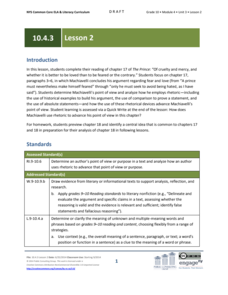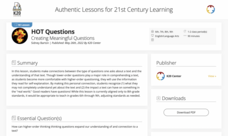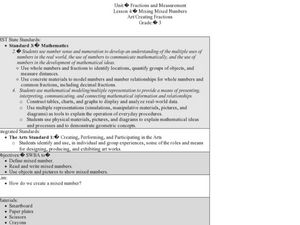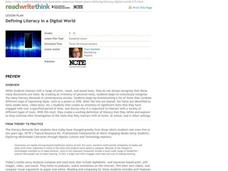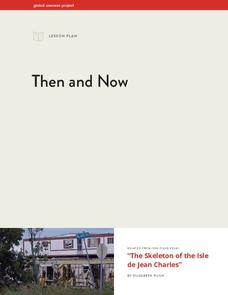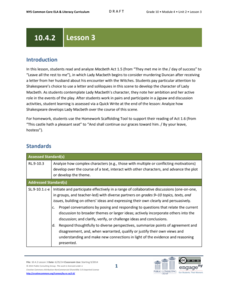PBS
Decoding Media Bias
Alternative facts? After watching the We The Voters film, "MediOcracy," viewers compare how cable news outlets CNN, Fox News, and MSNBC report the same story about politics or public policy. After a whole-class discussion of their...
Anti-Defamation League
Shirley Chisholm: Unbought, Unbossed and Unforgotten
A 13-page packet introduces high schoolers to a lady of amazing firsts. Shirley Chisholm was the first Black woman elected to Congress, the first Black woman to run for President of the United States, and a leader of the Women's Rights...
K20 LEARN
Worcester v. Georgia: Cherokee Sovereignty and Actions of the U.S. Government
Young historians study the Supreme Court case "Worcester v. Georgia" and note instances where the Justices defended the sovereign rights of the Cherokee. They also examine the actions of President Andrew Jackson and the provisions of...
EngageNY
Grade 10 ELA Module 4: Unit 3, Lesson 4
According to Machiavelli, a good ruler does whatever it takes. Using the resource, scholars work in small groups to analyze quotes from The Prince and then participate in a whole-class discussion. To finish, pupils select a phrase and...
EngageNY
Grade 10 ELA Module 4: Unit 3, Lesson 2
How do rhetorical devices advance an author's point of view? Scholars consider this question as they continue exploring Machiavelli's The Prince. They work in small groups, annotating the text for evidence of rhetoric before engaging in...
EngageNY
Grade 11 ELA Module 1: Unit 2, Lesson 20
How does the setting impact other elements within a play? Using a helpful resource, scholars explore the question by completing a Quick Write after reading Act 5.1 of Shakespeare's Hamlet. Additionally, they engage in a whole-class...
EngageNY
Analyzing the Content of a Model Essay: “How Ha’s Mother Is Turned ‘Inside Out’”
What are the psychological and emotional effects associated with being a refugee? Scholars consider the question by reading and analyzing an essay, "How Ha's Mother is Turned 'Inside Out.'" Once finished, they engage in a whole-class...
Core Knowledge Foundation
Early American Civilizations Tell It Again!™ Read-Aloud Anthology
Bridge subjects ancient history and English language arts together with a unit all about the Maya, Aztec, and Inca civilizations. Eleven lessons begin with a read-aloud followed by a whole-class discussion in preparation for practice by...
National Woman's History Museum
Women of Wonder: Who Do I Admire?
Celebrate superwomen during Women's History Month with a instructional activity that showcases a variety of female role models. Following a whole-class discussion on superheroes, role models, respect, and admiration, scholars listen to...
Teaching Tolerance
Privacy and Security Online
Don't forget to dust for digital footprints! Scholars engage in a whole-class discussion about how digital footprints compromise online safety and privacy. Next, small groups create posters to illustrate what it looks like to follow...
Angel Island Immigration Station Foundation
Leaving Home Forever: What Would You Put In Your Suitcase?
Scholars put themselves in an immigrant's shoes to decide what items they would take on their journey to a new home. Learners read primary sources, take part in a whole-class discussion, and make a list that they share with their peers,...
K20 LEARN
HOT Questions: Creating Meaningful Questions
Scholars examine a list of questions and sort them into corresponding groups based on similarities. A gallery walk allows peers to see how their peers sorted questions and leave notes. Costa's Level of Questions is the topic of a...
K20 LEARN
Sweet and Savory Writing: Descriptive Writing
The engagement is in the details. Young scholars learn the benefit of weaving descriptive and sensory details into the fabric of their writing through the activities in this lesson. As their hands explore items concealed in bags, a...
Curated OER
Mixing Mixed Numbers Art/Creating Fractions
Third graders explore number values by participating in class math activities. In this fractions lesson, 3rd graders collaborate with classmates to discuss the technique of adding mix numbers while utilizing paper plates to help...
Media Education Lab
Understanding Viral Messages
Imagine advertising for a product but not being paid to do so. Welcome to the world of Viral Messaging. Class members first view a T-Mobile flash mob video that went viral and has been seen by over 14 million viewers. After analyzing the...
iCivics
NewsFeed Defenders Extension Pack
Accuracy, transparency, trustworthiness, and impartiality are four unspoken rules of journalism. Scholars delve deep into the subject by discussing the pros and cons of relying on social media for news. They also play an online game to...
Illustrative Mathematics
High Blood Pressure
Does watching TV increase one's blood pressure? Assess student understanding of how study design dictates whether a conclusion of causation is warranted. Use this as a prompt for a small group or whole class discussion, or as a part of a...
Council for the Curriculum, Examinations and Assessment
Health and the Whole Person
Health is more than measuring your blood pressure and eating nutritious foods. Eighth graders discuss the factors that play into an individual's health, including spirituality, social life and friendships, emotional stability, cognitive...
Council for the Curriculum, Examinations and Assessment
Health and the Whole Person
To begin the second year of a health and wellness course, class members review the aspects of social, physical, emotional, cognitive, and spiritual health investigated the previous year. After completing the provided self-assessment...
ReadWriteThink
Defining Literacy in a Digital World
What skills are necessary to interact with different types of text? Twenty-first century learners live in a digital world and must develop a whole new set of skills to develop media literacy. Class members engage in a series of...
Center for Civic Education
What Is Authority?
Young scholars examine the concepts of power and authority as they begin learning about government in this elementary social studies lesson. Through a series of readings, discussions, and problem solving activities, children learn about...
Global Oneness Project
Then and Now
The devastating changes happening to the Native American inhabitants of an island off the coast of Louisiana are the topic of an informational lesson. After scholars break into groups to explore particular topics, they come back together...
EngageNY
Grade 10 ELA Module 4: Unit 2, Lesson 3
How does Lady Macbeth's ambition help advance the plot of Shakespeare's Macbeth? Scholars explore the topic using discussion and a jigsaw activity. Next, they complete a quick write to analyze how Shakespeare develops Lady Macbeth's...
EngageNY
Grade 10 ELA Module 4: Unit 2, Lesson 13
Lady Macduff uses a metaphor to suggest that her husband does not possess the courage of even a tiny, short-winged bird—ouch! Using the resource, pupils discover Act 4.2 of Shakespeare's Macbeth. Using reading, writing, and discussion,...






